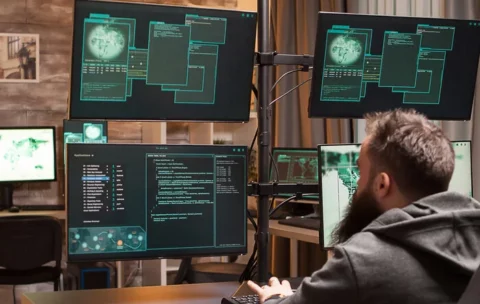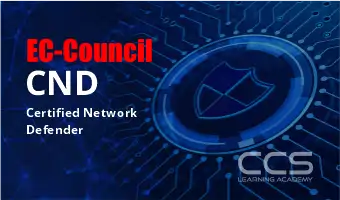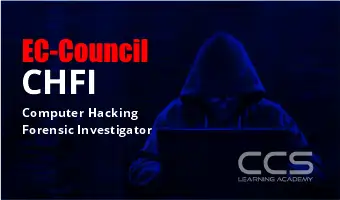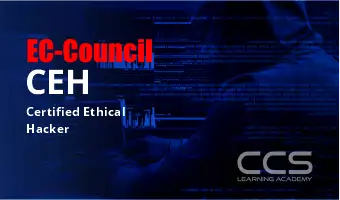Filter by Topic
Filter by Vendor
Cisco CCNP Enterprise: ENARSI eLearning
Course Description: The Implementing Cisco Enterprise Advanced Routing and Services …
What you'll learn
Configure classic Enhanced Interior Gateway Routing Protocol (EIGRP) and named EIGRP for IPv4 and IPv6
Optimize classic EIGRP and named EIGRP for IPv4 and IPv6
Troubleshoot classic EIGRP and named EIGRP for IPv4 and IPv6
Configure Open Shortest Path First version 2 (OSPFv2) and OSPFv3 in IPv4 and IPv6 environments
Optimize OSPFv2 and OSPFv3 behavior
Troubleshoot OSPFv2 for IPv4 and OSPFv3 for IPv4 and IPv6
Implement route redistribution using filtering mechanisms
Troubleshoot redistribution
Implement path control using policy-based routing (PBR) and IP service level agreement (SLA)
Configure Multiprotocol-Border Gateway Protocol (MP-BGP) in IPv4 and IPv6 environments
Optimize MP-BGP in IPv4 and IPv6 environments
Troubleshoot MP-BGP for IPv4 and IPv6
Describe the features of Multiprotocol Label Switching (MPLS)
Describe the major architectural components of an MPLS VPN
Identify the routing and packet forwarding functionalities for MPLS VPNs
Explain how packets are forwarded in an MPLS VPN environment
Implement Cisco IOS Dynamic Multipoint VPNs (DMVPNs)
Implement DHCP
Describe the tools available to secure the IPV6 first hop
Troubleshoot Cisco router security features
Troubleshoot infrastructure security and services
CompTIA Linux+ eLearning Bundle
CertMaster Learn Details What is CertMaster Learn integrated with CompTIA …
CompTIA Cybersecurity Analyst (CySA+) eLearning Bundle
CertMaster Learn+Labs Details What is CertMaster Learn integrated with CompTIA …
CompTIA Network+ eLearning Bundle
What is CertMaster Practice? CompTIA CertMaster Practice is an online …
Cisco CCNA: Implementing and Administering Cisco Solutions eLearning
Course Description The Implementing and Administering Cisco Solutions (CCNA) course …
What you'll learn
Describe network fundamentals and build simple LANs
Understand routing operations and configuration
Manage network device security
Expand small to medium-sized networks with WAN connectivity
Demonstrate IPv4 and IPv6 basics
Certified Network Defender | CND
Course Description Certified Network Defender (CND) is a vendor-neutral, hands-on, …
Computer Hacking Forensic Investigator | CHFI
Course Description The Computer Hacking Forensic Investigator (CHFI) course delivers …
What you'll learn
Establish threat intelligence and key learning points to support pro-active profiling and scenario modeling
Perform anti-forensic methods detection
Perform post-intrusion analysis of electronic and digital media to determine the who, where, what, when, and how the intrusion occurred
Extract and analyze of logs from various devices like proxy, firewall, IPS, IDS, Desktop, laptop, servers, SIM tool, router, firewall, switches AD server, DHCP logs, Access Control Logs & conclude as part of investigation process.
Identify & check the possible source / incident origin.
Recover deleted files and partitions in Windows, Mac OS X, and Linux
Conduct reverse engineering for known and suspected malware files
Collect data using forensic technology methods in accordance with evidence handling procedures, including collection of hard copy and electronic documents
The computer forensic investigation process and the various legal issues involved
Evidence searching, seizing, and acquisition methodologies in a legal and forensically sound manner
Types of digital evidence, rules of evidence, digital evidence examination process, and electronic crime and digital evidence consideration by crime category
Roles of the first responder, first responder toolkit, securing and evaluating electronic crime scene, conducting preliminary interviews, documenting electronic crime scene, collecting and preserving electronic evidence, packaging and transporting electronic evidence, and reporting the crime scene
Setting up a computer forensics lab and the tools involved in it
Various file systems and how to boot a disk
Gathering volatile and non-volatile information from Windows
Data acquisition and duplication rules
Validation methods and tools required
Recovering deleted files and deleted partitions in Windows, Mac OS X, and Linux
Forensic investigation using AccessData FTK and EnCase
Steganography and its techniques
Steganalysis and image file forensics
Password cracking concepts, tools, and types of password attacks
Investigating password protected files
Types of log capturing, log management, time synchronization, and log capturing tools
Investigating logs, network traffic, wireless attacks, and web attacks
Tracking emails and investigating email crimes
Mobile forensics and mobile forensics software and hardware tools
Writing investigative reports
Dark Web Forensics and IOT Forensics
Certified Ethical Hacker | CEH
This Certified Ethical Hacker Certification is designed to teach students …
What you'll learn
Information security controls, laws, and standards.
Foot printing, foot printing tools, and countermeasures.
Network scanning techniques and scanning countermeasures.
Enumeration techniques and enumeration countermeasures.
Vulnerability analysis to identify security loopholes in the target organization’s network, communication infrastructure, and end systems.
System hacking methodology, steganography, stag analysis attacks, and covering tracks to discover system and network vulnerabilities.
Different types of malware (Trojan, Virus, worms, etc.), system auditing for malware attacks, malware analysis, and countermeasures.
Packet sniffing techniques to discover network vulnerabilities and countermeasures to defend against sniffing.
Social engineering techniques and how to identify theft attacks to audit human-level vulnerabilities and social engineering countermeasures.
DoS/DDoS attack techniques and tools to audit a target and DoS/DDoS countermeasures.
Session hijacking techniques to discover network-level session management, authentication/authorization, and cryptographic weaknesses and countermeasures.
Web Server attacks and a comprehensive attack methodology to audit vulnerabilities in web server infrastructure, and countermeasures.
Web application attacks, comprehensive web application hacking methodology to audit vulnerabilities in web applications, and countermeasures.
SQL injection attack techniques, injection detection tools to detect SQL injection attempts, and countermeasures.
Wireless encryption, wireless hacking methodology, wireless hacking tools, and Wi-Fi security tools.
Mobile platform attack vector, android vulnerability exploitations, and mobile security guidelines and tools.
Firewall, IDS and honeypot evasion techniques, evasion tools and techniques to audit a network perimeter for weaknesses, and countermeasures.
Cloud computing concepts (Container technology, serverless computing), the working of various threats and attacks, and security techniques and tools.
Penetration testing, security audit, vulnerability assessment, and penetration testing roadmap.
Threats to IoT and OT platforms and defending IoT and OT devices.
Cryptography ciphers, Public Key Infrastructure (PKI), cryptography attacks, and cryptanalysis tools.










